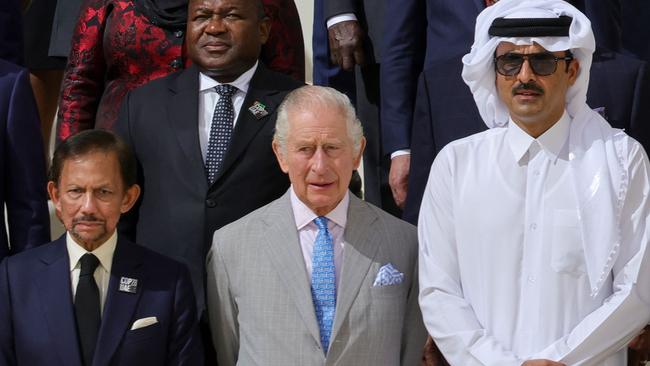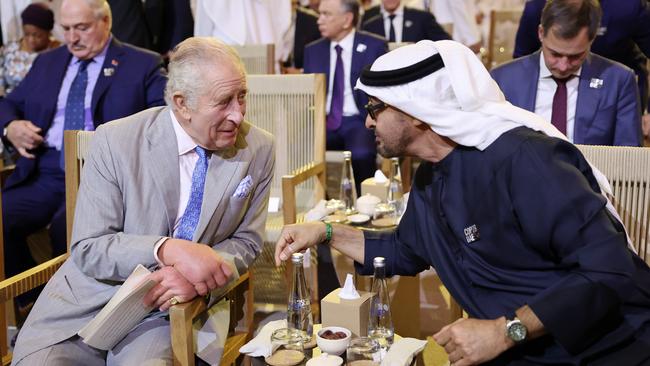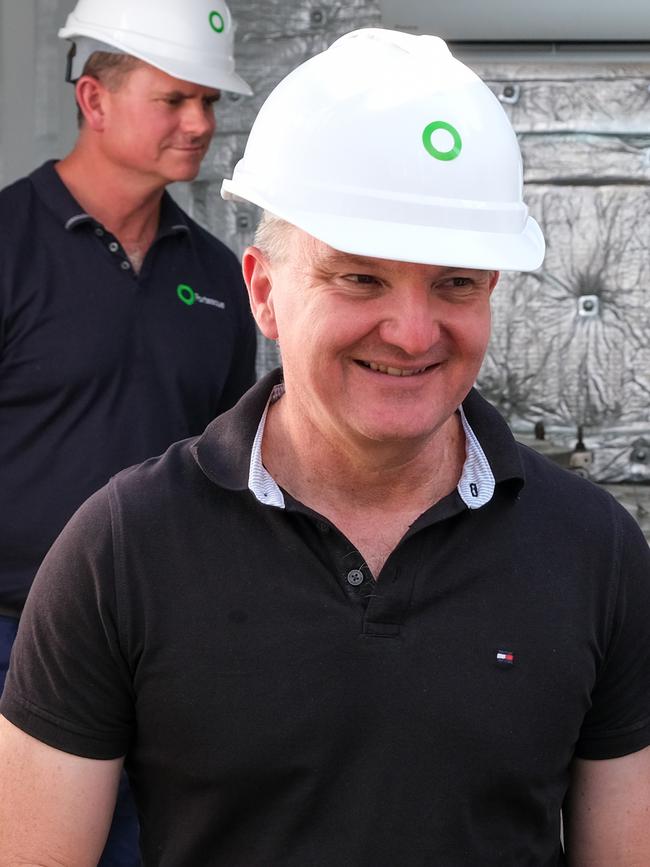King Charles ramps up alarmism ... seemingly unaware of his own carbon footprint
The climate activists flew into Dubai’s airconditioned comfort with the finest of foods, ocean views to the front, desert sands behind, and megalitres of oil and gas below.

Still, the paradoxes and cant were as thick in the air as greenhouse gases when the usual climate crew turned up in Dubai for the UN’s climate talkfest.
In the United Arab Emirates they had chosen one of the richest countries in the world that ranks as a global top 10 oil exporter and top 10 gas exporter, whose glittering cities have been built with carbon-intensive materials paid for by petrodollars, and whose domestic emissions have doubled across the past two decades while Australia’s have been reduced.
In short, the UAE is no poster child for greenhouse gas reduction. But it is warm. The climate activist grifters got to escape the northern winter at a place they knew would be sunny. In Dubai they flew into airconditioned comfort with the finest of foods, ocean views to the front, desert sands behind, and megalitres of oil and gas below.
What sane politician, technocrat or billionaire would want to deal with snow before Christmas? Their mittens and apres boots would already be packed and earmarked for Davos in January.
So long as they ignored the plight of the foreign workers, slaving away in the heat, bunking in together without airconditioning or a minimum wage, sending their pay back to Bangladesh or Pakistan to stave off their families’ existential crises, the COP delegates could focus on climate action.

They probably would have needed to shut out any thoughts about the women of the emirates too; pondering their mistreatment and limited rights might create an uncomfortable distraction.
With smaller fossil fuel reserves than the other emirates, Dubai has looked to diversify its economy, primarily as an air transport and tourism hub. Whoops! There go those hydrocarbons again.
The first time I went to the UAE we visited a horticultural institute that consisted of a couple of desultory buildings in the shifting desert sands with nary a plant to be seen. It seemed incongruous, even comical, but this was a political visit and there was supposed to be some kind of symmetry between the dryland farming, horticulture and irrigation know-how of South Australia and the challenges confronting this outpost on the parched sandhills of the Arabian Peninsula.
This was in 2000, and the place was growing like topsy already. Since then its population has more than tripled from three million people to almost 10 million, and the skyscrapers, artificial islands and airport infrastructure have expanded like a crystal kit.
But there are also trees and magnificent gardens to soften the contrast between the silicate glass towers and their silica antecedents in the dunes. The oasis effect of this greenery comes at a cost; it is watered by groundwater pumped to the surface, treated effluent or seawater desalinated at any of dozens of plants – all these forms of water require energy, especially the desalination.
Given this energy intensity, the UAE is perhaps the only place in the world where plants might have a carbon footprint – the emissions generated to water them might outstrip the CO2 they absorb.
This is probably not the “harmony and balance” King Charles III spoke about when he opened COP28 and implored the gathering to “restore nature’s unique economy” because it was the “ultimate sustainer” without which “our own economy and survivability will be imperilled”.
At this point I feel I should remind readers that this climate evangelist is our King too. The King of Australia – God save him.
Seemingly unaware of his own carbon footprint, not to mention the apolitical ideal of his role, the King ramped up the alarmism.
“The dangers are no longer distant risks,” he sermonised. “I have seen across the Commonwealth, and beyond, countless communities which are unable to withstand repeated shocks, whose lives and livelihoods are laid waste by climate change.”
Scary words. But, of course, he did not, and could not, refer to a single specific community. He seemed to lack the self-awareness to understand how these sweeping claims only confirm the weakness of any specific calls to action.
“I have spent a large proportion of my life trying to warn of the existential threats facing us over global warming,” he boasted, in a tone that suggested this might have been a service to humanity. Yet we are still here.
Informed by the UN, presumably, this bloke has been warning of “tipping points” since Greta Thunberg was in nappies and warned about another “tipping point” before he jetted out of Dubai. We must just about be at our tipping point on tipping points.
And just before I move on from the King, he also spruiked an “indigenous world view” and a “grand and sacred system” that means “Earth does not belong to us” but that “we belong to Earth”.
Now this would be all well and good from an Instagram influencer or folk singer, but King Charles also happens to be the titular head of the Church of England. Can he be a Christian leader and an animist? Is that sustainable?
Still, for all the hypocrisy and nonsense, we should be grateful that this COP found a rare moment to embrace the inevitable reality of nuclear power. The commitment to triple nuclear energy by 2050 was driven by the US, Britain, France, Canada, Japan, South Korea, Sweden, Finland and others including the host nation.
This finally was recognition of the bleeding obvious – even the International Energy Agency concedes that without a substantial boost in nuclear electricity generation there is no way the world can reach net zero. Yet I could not find much about this on the COP28 website; it seems the UN is officially embarrassed by this nod to the real world, preferring to focus on clunky and unreliable renewables, and much talk from the Pope and others about wealth redistribution.
Even the UAE has gone nuclear with a massive 5 gigawatt, four-reactor plant supplying about a quarter of the country’s power and diversifying its energy sources to boost energy security while lowering emissions. By way of comparison this project has been completed in less time than Snowy 2.0 is likely to take, and it will cost perhaps 50 per cent more. But unlike Snowy, which merely stores energy when it is available, the Barakah nuclear plant will supply additional, reliable, dispatchable power (more than twice as much as Snowy 2.0 can store) around the clock for 70 years or more.
Two plants like this, say one in the Hunter Valley and one in the Latrobe Valley, would solve Australia’s energy security crisis for more than a half-century with an emissions-free solution. They would cost less than we have already spent on renewable energy projects, and only a fraction of the minimum $300bn of renewable investment still to come.
They also would have a geographic footprint that is only a tiny fraction of the vast array of renewable projects creating angst around the nation. And they would not require additional transmission lines, saving another $100bn and preventing further environmental degradation.
Australian teenage nuclear campaigner Will Shackel was in Dubai and buttonholed French President Emmanuel Macron, who volunteered that Australia should get rid of its legislative nuclear energy ban. It is telling that much of the mainstream media and Canberra press gallery seems incapable of confronting the inescapable logic and engineering necessity of a domestic nuclear industry – clearly ideology overrides rationality.

“Nuclear energy is back,” Macron proudly declared at COP28, which must have come as some sort of surprise to our Climate Change and Energy Minister, Chris Bowen, who pretends nuclear has gone the way of the kerosene heater. Perhaps this provides a great opportunity for Australia to repair its relationship with France, which was torpedoed by the nuclear subs deal. We could contract the French to build a nuclear power plant or two instead.
Perhaps the UAE’s nuclear plant, along with its willingness to host upwards of 70,000 COP28 visitors and mouth the platitudes of climate action, is all a bit of a ruse to win cover for its ongoing hydrocarbon romance. That said, if Bowen were committed to nuclear energy to boost his chances of hosting COP31 in 2026 it might be worth the expense of bringing this circus Down Under.
They could stage this global festival of unabated alarmism and nauseating virtue-signalling at the Great Barrier Reef before it disappears or drowns or whatever calamity is supposed to befall it. Perhaps the King could trouble himself to jet down and open it again. It would be a terrific opportunity to declare another tipping point.






In the dark recesses of my heart lurks a climate alarmism iconoclast who wished the COP28 climate talks had been held in Europe, where a bitterly cold start to winter saw snow dumps delay flights and strain energy supplies. It would have been amusing to have the global warming catastrophists circling, say, Munich’s Franz Josef Strauss airport in their private jets, unable to land and squandering fuel while working on alternative plans.